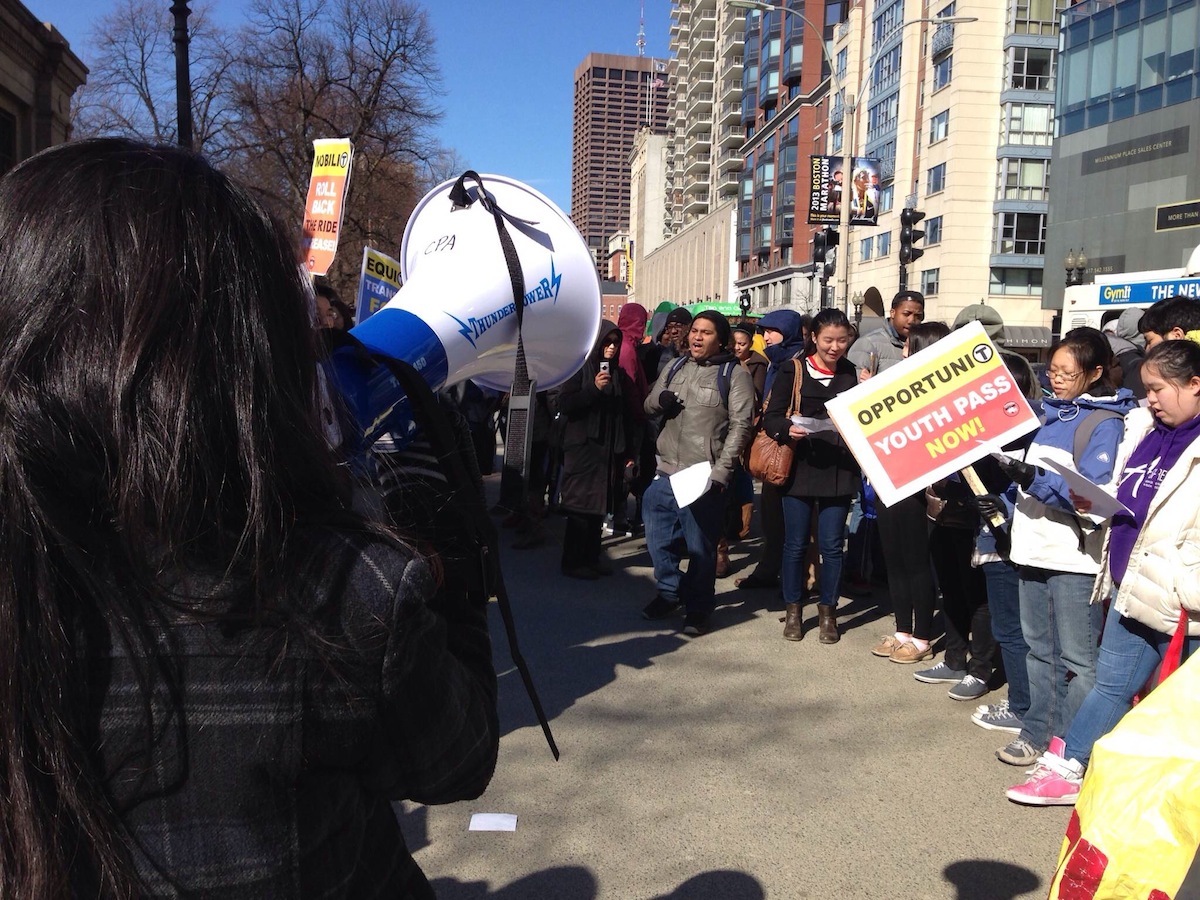MBTA Plans to Offer Youth Pass, University Pass as Part of One-Year Pilot Program

Photo by Steve Annear
The MBTA is planning to roll out two new pilot programs that would offer young riders between the ages of 12 and 18, as well as area college students, special monthly passes to ride the T’s buses and trains.
On Thursday, T officials will unveil their final plans for the “Youth Pass” and “University Pass” proposals to the MassDOT Board of Directors. The board doesn’t have to vote on the matter, but can choose to stall it if necessary.
Provided they support the proposals—they’re expected to move forward with the plans—the pilots will begin on July 1, 2015, and last an entire year. If successful, the MBTA will explore extending the special pass programs beyond that period.
The Youth Pass, which would expand the $26 student pass to all people between the ages of 12 to 18, regardless of whether their school offers it, is the result of a year of protests led by local advocacy groups upset that a more affordable monthly pass for younger students and kids riding the MBTA wasn’t available.
Just in the last year alone, members of the Youth Affordabilit(T) Coalition, or YAC, an amalgamation of organizations founded by the Youth Way on the MBTA campaign in 2012, staged protests inside MassDOT headquarters, risking arrest, to call for a youth pass option.
Their final civil action in late June resulted in MBTA General Manager Beverly Scott and then-secretary of MassDOT Richard Davey agreeing to sit down with the groups to hammer out details for such a program. After signing a Memorandum of Understanding, they created a working group to devise the pilot.
“For the last six months or so, we have been working as sort of a collaborative external and internal team,” said Clinton Bench, head of MassDOT’s planning department.
According to details about the Youth Pass proposal, provided to Boston by the MBTA, the special program would be offered to 1,500 riders within the target age group. The T said in its informational proposal that the pass is intended to “mitigate the youth transit affordability crisis” in the Greater Boston area. The pool of participants would be offered the passes through partnerships with municipalities, who would be responsible for distributing them to each person.
Members of YAC did not return request for comment, but Bench said that they worked closely with representatives from the group to put together the plan.
“The working group process we have had has been very productive. I was most impressed with the willingness of advocates to learn the ins-and-outs of how the T finances work,” he said. “They were committed to more than just a discounted fare. They’re also committed to the idea of committing to sustainable transportation options for kids in Massachusetts, and this is a way to encourage those folks to continue using public transportation.”
YAC members are organizing a celebration at MassDOT headquarters on Thursday, December 11, when the board meets to hear details about the Youth Pass.
The university pass program, or UPass, which the MBTA hopes will offset the costs of testing out the Youth Pass, will be offered to any college or university whose students rely heavily on public transit. After entering into agreements with schools interested in the pilot, students would be able to get a monthly T pass for half the cost of a LinkPass. The pass will either be offered to undergraduates, or both undergraduate and graduate students.
The MBTA will target Northeastern, Tufts, and Harvard first, but said all schools can participate if interested, according to the presentation delivered to the T’s finance committee last week.
“The intent of the UPass financially is that it would be revenue positive for the MBTA, and that’s part of the reason why we are looking to move forward with both programs at the same time,” said Bench. “One thing the GM has made clear is that they need to be fiscally sustainable—we are in no position to sustain losses for a program. But hopefully they will at least be revenue neutral.”
The chips traditionally used to give riders access to T entry points would be embedded in students’ college ID cards, according to details. Bench said that the T would like to work with as many schools as possible to maximize revenue for the pilot. “We are happy to have any school participate,” said Bench. “There is probably an administrative limit we could reach on the pilot period, but we would ideally have three universities participating.”
Once launched, the MBTA plans to analyze data to “better project the impacts of both programs and develop systems to implement them” past the one-year mark. The transit agency wants to design the pilots so that if they choose to extend the programs, they will have minimal impact on the T’s revenue stream. They hope that by offering discounted options it will increase overall ridership, and promote the appeal of taking public transportation to young people in the area.
“We came up with 47 colleges and institutions that we consider to be close enough to rapid transit and buses to use the passes,” said MBTA spokesman Joe Pesaturo. “Some day we’d love to have all 47 be part of this program. It’s great for them, and great for the environment, and a win-win for everyone.”
A “stepped up” awareness program about the UPass will be implemented provided the MassDOT board agrees with the approach, he said.
The outlines for both the Youth Pass and UPass proposals can be read below. The T said the plans are likely the first of their kind in the country:
U+YPass combined Pilot Program Presentation

